Fr. Massa to discuss his new book on the U.S. fundamentalist Catholic movement


Fr. Massa to discuss his new book on the U.S. fundamentalist Catholic movement

BY KATHLEEN SULLIVAN STAFF WRITER
The Connell School of Nursing has launched a new master of science degree program in nurse-midwifery, the only such program in Eastern Massachusetts. The program will produce nurse-midwives capable of responding to the nationwide shortage of obstetric care providers and addressing the maternal mortality crisis in the United States.
Certified nurse-midwives are advanced practice clinicians with expertise of care during pregnancy, childbirth, and the postpartum period. They care for patients from adolescence throughout the lifespan as well as for newborns during the first month of life.
For BC contingent, building community was at the heart of pilgrimage to Spain
BY ELLEN SEAWARD SPECIAL TO THE CHRONICLE
Over spring break, 21 Boston College seniors traveled to Spain to retrace the journey of St. Ignatius, the founder of the Society of Jesus, as part of a new leadership Capstone course titled The Discerning Pilgrim.
What had these BC pilgrims—interviewed following their return to campus— been looking forward to the most about the experience?
Community, they answered. Over and over and over again.
“I left for Spain yearning to better know my peers and connect with them through
“I can’t think of a better profession than being a nurse-midwife,” said CSON Associate Professor of the Practice Katharine Hutchinson, director of BC’s nursemidwifery program. “You get to be present with people at some of their most vulnerable moments and ensure that they are getting the most respectful, clinically excellent, evidence-based, and personalized care that everyone deserves, regardless of their background.”
Nurse-midwives also support vulnerable communities through health education, health promotion, and risk assessment and management. According to Hutchinson, nurse-midwives fill gaps in access to care that most directly impact populations with poor health outcomes.
Continued on page 5
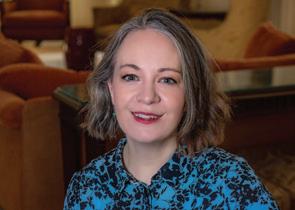
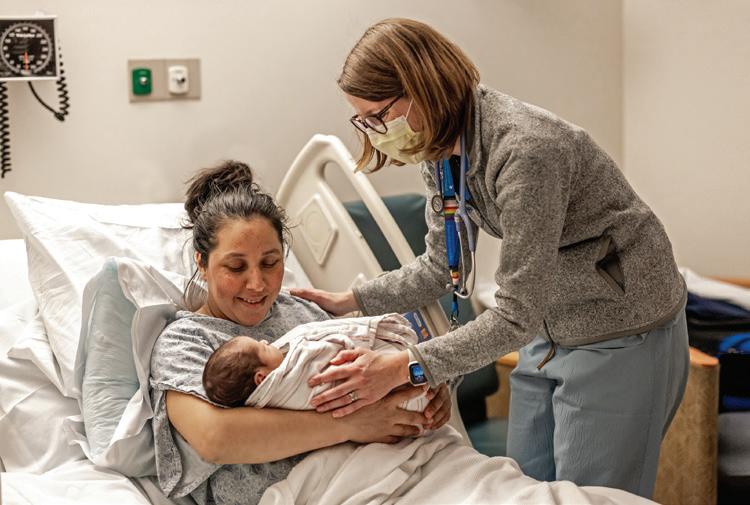
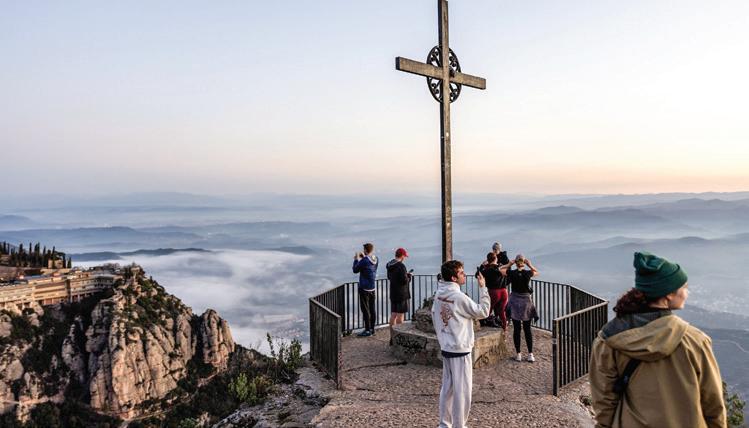
BY JACK DUNN ASSOCIATE VICE PRESIDENT FOR UNIVERSITY COMMUNICATIONS
Boston College has admitted its strongest and most selective class in University history, extending approximately 5,000 offers of admission from a pool of 39,681 applicants for an acceptance rate of 12.6 percent.
shared experiences,” said Maija O’Hara.
“The way everyone showed up in full each day in Spain far surpassed my expectations. I did not know how much I stood to learn from those individuals around me.”
Johany Jeune found the experience hard to put into words.
“We all opted into this class, whatever it looked like,” Jeune said. “We all leaned into the unknown. I describe it as ‘I walked into a class full of strangers at the beginning of the semester, but I’m leaving it bonded to people in a way I could not
Continued on page 4
The admitted students come from all 50 states, Washington, D.C., five United States territories, and 77 countries. Twelve percent will be the first in their families to attend college and nine percent are international citizens. Forty-eight percent are male and 52 percent are female.
Academically, 95 percent of the admitted students rank within the top 10 percent of their graduating classes and their
Continued on page 8
Members of the Boston College community are gearing up again to make a splash into 30-degree water to raise funds for Massachusetts Special Olympics at the third annual BC Polar Plunge, which takes place at noon on April 5 in front of the Margot Connell Recreation Center.
The Boston College Police Department, in collaboration with the Law Enforcement Torch Run for Special Olympics and BC Special Olympics, will host the event. Participants will take the plunge into an above-ground mobile swimming pool.
Each year, supporters of Massachusetts Special Olympics gather to plunge into oceans, lakes, or pools. The proceeds from the Polar Plunge directly fund year-round sports training and competition for athletes with intellectual disabilities in Massachusetts.
In its first year, the BC Polar Plunge raised nearly $24,000, more than double its original goal of $10,000; last year, the event beat its goal of $30,000. This year, organizers have upped the mark to $40,000.
This year’s campus plunge will include music, raffles, food, and refreshments supplied by Dining Services, and the notorious “Bear Force One” mobile pool, named for Polar Plunge mascot P-Bear the Polar Bear.
“Now that we are in our third year, I’m realizing that there are a lot of moving
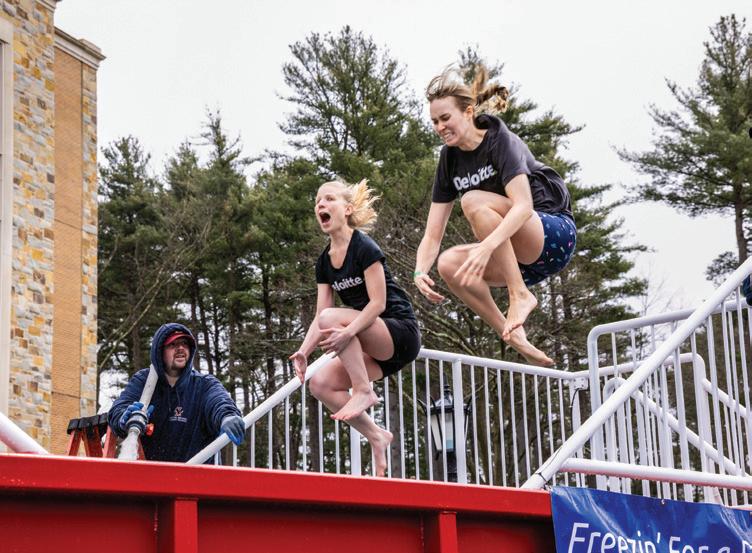
parts that need to be handled in preparation for the day,” said BCPD Detective Kevin Christopher, a delegate for the Massachusetts Special Olympics and pioneer of the BC Plunge. “We collaborate with everyone from Athletics to Parking, Facilities Services, Dining Services, and more to
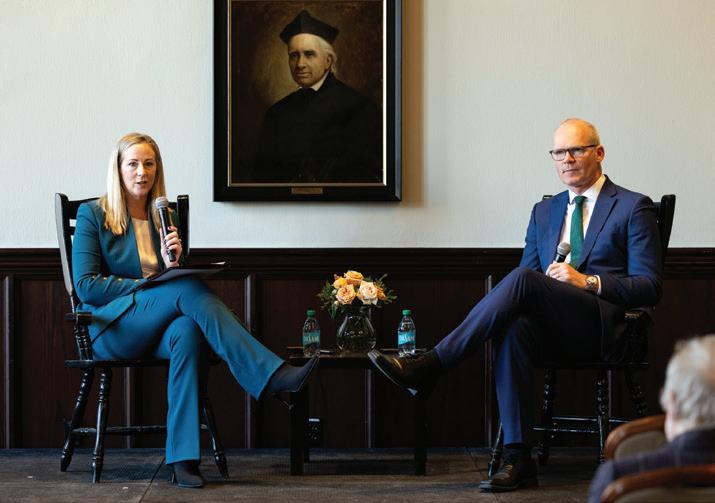
make it all possible. It’s so worth it because everyone is so great to work with and the day is such a blast.
“Last year, there were so many smiles and students dancing to the music in costumes. I remember one of our copresidents being so excited and yelling, ‘Are
you ready to plunge? Let’s go!’ People were ready to sprint for the mobile pool before I even gave the safety briefing.”
The creation of the BC Polar Plunge was part of an effort to reintroduce fundraising activities at the collegiate level, noted Christopher, who spearheaded efforts to get BC Special Olympics recognized as an official University club many years ago.
Other Boston-area colleges and universities like Brandeis, Harvard, and UMass-Boston have followed suit by organizing their own Polar Plunges that have attracted large crowds of excited plungers. In 2024 alone, Polar Plunge events across Massachusetts raised over $1 million for Special Olympics efforts, the largest collected sum ever in its history, according to its website.
“Raising funds for Special Olympics is important and the primary goal, but I measure the success of the Polar Plunge through the smiles,” said Christopher. “I imagine this event growing bigger and bigger every year through lighthearted fun— so big that it can practically run itself.”
For more information or to register for the plunge, go to fundraise.specialolympicsma.org/index.cfm?fuseaction=donorDrive. event&eventID=822. Donations will remain open for up to a week after the plunge.
—Audrey Loyack
The Office for Institutional Diversity and the division of Human Resources will hold the 10th annual Boston College Diversity and Inclusion Summit on May 28 in Gasson Hall, as part of the University’s mission to advance a welcoming and respectful environment that celebrates dialogue across diverse perspectives.
Registration for the summit, which this year is themed “Reflect, Renew, and Recommit,” will begin this coming Tuesday, April 1.
The morning keynote will inspire reflection on how the Jesuit and Catholic mission emphasizes the importance of building and advancing a culture of inclusion and belonging, say summit organizers. The day’s events and activities will highlight the vital role these principles play in fulfilling BC’s mission and nurturing a campus community where everyone feels valued, respected, and able to bring their best selves to the working and learning environment.
“The theme ‘Reflect, Renew, and Recommit’ invites us to celebrate the significant progress made in cultivating an inclusive campus community while also infusing new energy into our ongoing initiatives,” according to the organizers. “This is a reaffirmation of Boston College’s steadfast commitment to its mission, vision, and core values of cura personalis—care of the whole person—and cura apostolica, care of the work.
Information on guest speakers and other summit details will be available at the summit website, www.bc.edu/diversity-summit. —University Communications
A photo caption in the March 13 edition of Boston College Chronicle misidentified the student dance troupe Masti. Chronicle regrets the error.
The Boston College Chronicle (USPS 009491), the internal newspaper for faculty and staff, is published biweekly from September to May by Boston College, with editorial offices at the Office of University Communications, 3 Lake Street, Brighton, MA 02135 (617)552-3350.
Distributed free to faculty and staff offices and other locations on campus.
Periodicals postage paid at Boston, MA and additional mailing offices.
POSTMASTER: send address changes to The Boston College Chronicle, Office of University Communications, 3 Lake Street, Brighton, MA 02135.
A flipbook edition of Chronicle is available via e-mail.
Send requests to chronicle@bc.edu.
Part of initiative to support teaching and scholarship in formative education
BY PHIL GLOUDEMANS STAFF WRITER
Holly R. VandeWall, a professor of the practice in Philosophy, has been named the second Ascione Faculty Formation Fellow for outstanding teaching and scholarship in support of the University’s commitment to formative education.
The Ascione Faculty Formation Fellowship is made possible by the generosity of 1993 Boston College alumni Katheryn H. and Michael C. Ascione, the parents of two current BC undergraduates. Michael Ascione has been a member of the BC Board of Trustees since 2021. The Asciones also serve as co-chairs of the BC Board of Regents.
The inaugural fellowship recipient was Belle Liang, a professor in the Lynch School of Education and Human Development Counseling, Developmental, and Educational Psychology Department, who was appointed in 2023.
“Holly VandeWall has been a vital presence in the Perspectives classroom since she arrived at Boston College,” said Provost and Dean of Faculties David Quigley, who noted that the fellowship’s donors strongly believe in the pursuit of distinctive faculty excellence at Boston College. “Her com-
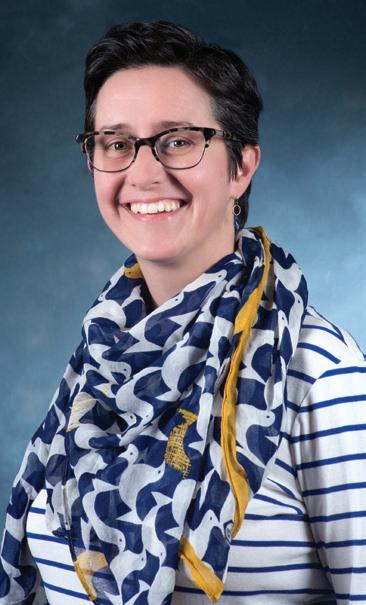
mitment to thoughtful mentorship transcends the classroom and has led her to engaging in a range of retreat experiences for students and other members of the University community. Her work embodies the best of our commitment to formative education.”
“The chance to teach, mentor, and serve at an institution devoted to formative education is one of the great blessings of my
“Holly VandeWall is a serious scholar and an extraordinarily dedicated teacher, accompanying her students in the classroom, on pilgrimage, and on many discernment retreats. Formative education animates all her work and indeed, as her friends know, her entire way of life.”
—Philosophy Chair Jeffrey Bloechl
life,” said VandeWall, who joined the BC faculty in 2008. “I’m honored to have my work recognized and supported by the Ascione Fellowship.”
VandeWall is co-author of the textbook History and Philosophy of Science: A Reader, and a general editor of the upcoming three-volume series, The History and Philosophy of Western Science: From Antiquity to the Present.
She is a long-time member and leader of the Jesuit Essentials group, which has focused on upholding the work of professors of the practice on campus, providing resources for them to support student mental health and inclusive classroom dynamics. She has spoken regularly at both departmental and University-wide events about student formation inside and outside the classroom; annually serves as an emcee for the Halftime student retreat program; and has led student international formation trips with the Arrupe Service Immersion Program and the Self-Knowledge and Reflection course, during which students
walk the Camino de Santiago pilgrimage route.
VandeWall received a doctorate in the history and philosophy of science at the University of Notre Dame, and holds a master’s degree in science and ethics from the Graduate Theological Union in Berkeley, Calif., as well as a master’s degree in science journalism from Boston University. She earned a bachelor of arts degree from Macalester College.
“Holly VandeWall epitomizes everything this Ascione Fellowship recognizes,” said Albert J. Fitzgibbons Professor Jeffrey Bloechl, chair of the Philosophy Department. “She is a serious scholar and an extraordinarily dedicated teacher, accompanying her students in the classroom, on pilgrimage, and on many discernment retreats. Formative education animates all her work and indeed, as her friends know, her entire way of life. I’m exceptionally pleased for Holly, and for those who will continue to learn from her example.”
Charles B. Seelig Professor of Philosophy Richard Kearney has received the prestigious Research Ireland St. Patrick’s Day Medal in honor of his achievements as an academic, author, and poet, and his efforts to aid the Northern Irish peace process. He was presented with the award by Irish Taoiseach (Prime Minister) Micheál Martin at a March 13 ceremony in Washington, D.C.
The Research Ireland St. Patrick’s Day Medal recognizes the contribution of academic and industry leaders in the United States across all disciplines—from science and engineering to the arts, humanities and social sciences—to the research ecosystem in Ireland and to collaboration between research in Ireland and the United States. Also honored was Northwell Health President and CEO Michael Dowling. Martin said the accomplishments of Kearney and Dowling “illustrate the exceptional work being carried out by the Irish research diaspora across the United States. The leadership and innovation of Professor Kearney and Mr. Dowling have been impactful across diverse areas, from aiding peace agreements to improving health care access. The Government of Ireland and Research Ireland are delighted to support transformative research such as this, which has wide-reaching benefits across Ireland and the U.S.”
A visiting professor at BC from 1986-
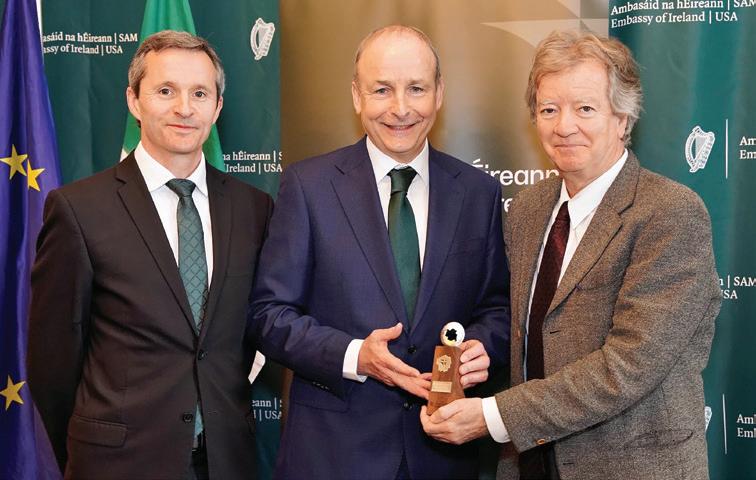
1998, Kearney was appointed to the Seelig Chair in 1999. His research includes the areas of phenomenology, hermeneutics, aesthetics, philosophy of religion and imagination, and narrative and film, and he has taught classes in Narrative Imagination, Carnal Hermeneutics, Phenomenology of Eros, and Hermeneutics of Religion. Kearney has authored more than 30
books on European philosophy and literature, including The Irish Mind, Navigations: Selected Irish Essays and recently co-edited Hosting Earth: Facing the Climate Crisis. He also has published fiction and poetry, and most recently the critically acclaimed 2023 novel Salvage, which is being adapted for film.
A public intellectual with an interest in
compelling contemporary issues, including the impact of climate change, Kearney was involved in drafting several proposals for a Northern Irish peace agreement and has offered comments and insights in Irish, European, and North American media.
He was a founding editor of The Crane Bag journal and his books on Irish studies include The Irish Mind, Transitions: Narratives in Irish Culture, and Navigations: Selected Irish Essays 1976-2006. He is currently the international director of the Guestbook Project—Hosting the Stranger: Between Hostility and Hospitality.
He has served as a visiting professor at University College Dublin—where he chaired the Irish School of Film—and the University of Paris, and is a former member of the Arts Council of Ireland and the Higher Education Authority of Ireland.
“I am honored to be awarded the Research Ireland St. Patrick’s Day Medal,” said Kearney. “My connection with Ireland has always been central to my career. Bringing people together to share stories and perspectives is key to addressing our era’s greatest challenges. Collaborations and exchanges can help to transcend divides and build peace and reconciliation. I look forward to continuing my work with colleagues in both the U.S. and Ireland to strengthen empathy and understanding.” —University Communications
have imagined.’”
In their week together, the classmates became fast friends—even family, according to Mary McElroy—as they traveled to Loyola, Xavier, Montserrat, and Manresa. For McElroy, retracing St. Ignatius’s steps was a way to link the places where the saint traveled to names which appear on BC’s campus.
“At these places,” she explained, “I engaged in various conversations ranging from our favorite foods to what it means to be a follower of God. The duality of these conversations allowed me to understand my classmates on so many different levels and allowed me to connect St. Ignatius’s footsteps with a newfound understanding of myself.”
But of all the cities, Montserrat and Manresa left the strongest impressions. During his pilgrimage, St. Ignatius visited the Benedictine monastery of Montserrat, a Gothic, Catalonian structure built into the side of the Montserrat Mountains. There he kept an all-night prayer vigil in front of a portrait of Our Lady before laying down his sword and continuing on his pilgrimage.
During the group’s first morning in Montserrat, the BC pilgrims woke before the sun and set out together in darkness, aiming to climb a peak to watch the sunrise.
“As we hiked, we began to warm up and with that warmth came conversation. However, once we emerged from behind the trees and saw the whole valley laid out before us, we were, for a moment, speechless,” O’Hara reflected.
“We were above the clouds, above almost everything except for the peaks of

Montserrat rising behind us. There was a gasp as someone saw the first rays of sun reaching into the morning sky.”
After Montserrat, St. Ignatius journeyed to Manresa, where he stayed 11 months and composed the Spiritual Exercises—a core set of meditations, prayers, and contemplations—in a cave. The BC pilgrims reached Manresa in time for Ash Wednesday and marked the day through a Mass in the same cave.
“The Mass could be described as a thin space between heaven and Earth,” said Katie Garrigan. “It was transformative. To be a pilgrim is a way of life through your spirit and engagements in the world around you.”
Now back firmly on the ground in Bos-
ton, the pilgrimage is over—but in many ways, say participants, it continues.
For example, Garrigan is trying to emulate what it means to be a pilgrim: “I’m trying new things, holding an inquisitive disposition, and connecting deeper with my community.”
Kateri Olechowski is trying to use time intentionally: “Was I really just in Spain a week ago? I know I will never forget how calm, eager, present, and loved I felt in those moments. I know that’s because of the people.”
That’s precisely the point, say Institute for Advanced Jesuit Studies Director Casey Beaumier, S.J., and Student Affairs Associate Vice President for Student Engagement and Formation Colleen Dallavalle, who co-
to Spain as part of The Discerning Pilgrim course.
created the class and accompanied students on the pilgrimage.
“I believe an opportunity like this helps to transmit depth and meaning to our students,” said Fr. Beaumier, who is a University vice president and University secretary. “Hopefully, it enriches their lives at BC and beyond.”
“It was inspiring to see the students recognize how their faith and formation at BC are not endpoints, but foundations for lives of purpose, love, and service,” added Dallavalle. “This journey affirmed that their mission extends beyond BC—to set the world aflame.”
Ellen Seaward is a senior digital content writer in the Office of University Communications
BY PHIL GLOUDEMANS STAFF WRITER
Between 1999-2021, American adolescents steadily desisted from risky behaviors such as substance use and violence, and from reporting a combination of both risky behaviors and mental health symptoms. Yet a comparatively small but growing proportion of youth demonstrated elevated symptoms of depression, according to a report—whose lead author is Boston College faculty member Rebekah Levine Coley—to be published in the April 2025 issue of Pediatrics.
The study, published online earlier this month, and titled “Trends in Mental and Behavioral Health Risks in Adolescents: 1999-2021,” analyzed data from the national biennial Youth Risk Behavior Surveys distributed by the Centers for Disease Control and Prevention.
A total of 178,658 students in grades 9-12 nationwide were analyzed across the entire research timeline. Results revealed that most adolescents—and increasing proportions over cohorts—ceased risky behavior such as substance use, unsafe
sexual activities, and violence, and did not display signs of mental health problems such as depression.
However, a small group of adolescents—representing less than nine percent of those surveyed—reported heightened mental health concerns such as increased symptoms of hopelessness and suicidality, and an even smaller proportion reported both heightened risky behavior and mental health problems, necessitating additional public health measures to intervene and promote enhanced well-being.
“Perhaps the most important finding from this work highlights the dominant and increasing prevalence of adolescents with low levels of internalizing behaviors who are also abstaining from multiple types of behavioral health risks,” said Coley, professor and Gabelli Family Faculty Fellow in the Lynch School of Education and Human Development and director of BC’s Center for Child and Family Policy. “Simultaneously, the relatively modest but increasing number of youths reporting elevated indications of depression points to target popula-

Rebekah Levine Coley: Recent evidence suggests that “the increased strengthening of depression and suicidal behaviors during the pandemic has finally turned.”
photo by lee pellegrini
tions for prevention and treatment efforts, which is critical information for policymakers and health practitioners seeking to optimize the well-being of United States
adolescents.”
She also underscored that, while rates of depressive symptoms and suicidality in American adolescents and young adults have been rising since 2009, the corrosive, exacerbating impact of the COVID-19 pandemic—as schools and businesses closed, social isolation surged, and financial and social stressors increased—appears to be lessening.
“Recent evidence has emerged from surveys conducted in 2023 suggesting that the increased strengthening of depression and suicidal behaviors during the pandemic has finally turned,” she said.
Coley noted that overall, these are positive and encouraging shifts, but there are still some areas of concern for U.S. adolescents, including increasing gun carriage and gun-related crimes by youth.
Co-leading the research with Coley was Jane Leer, an assistant professor of psychology at San Diego State University, and Lynch School doctoral candidate Lindsay Lanteri. The report is available via a title search at the American Academy of Pediatrics website, publications. aap.org.
Continued from page 1
“Nurse-midwives are crucial to addressing the crisis of maternal mortality we have in this country,” said Hutchinson, who has been a nurse-midwife for 20 years. Research from the Journal of the American Medical Association shows that globally the U.S. has the worst maternal mortality rate of high-income countries.
According to the American Journal of Obstetrics & Gynecology, midwifery is the standard of care in high-income countries with better maternal and neonatal outcomes than those found in the U.S.
“In addition to providing gynecologic care, midwives are advocates for their patients. It’s been shown that having a certified nurse-midwife on a patient’s care team improves outcomes while reducing perinatal health disparities,” she said. “Midwifery has never been more relevant than it is today.”
Pre-accredited by the Accreditation Commission for Midwifery Education, the CSON M.S. in Nurse-Midwifery program will enroll its first students in May. BC’s program is fully in-person, with degree completion possible in 24 months. There are fewer than 50 accredited nurse-midwifery programs in the entire U.S.
“We at the Connell School of Nursing are thrilled to be able to offer this new master’s degree in nurse-midwifery,” said
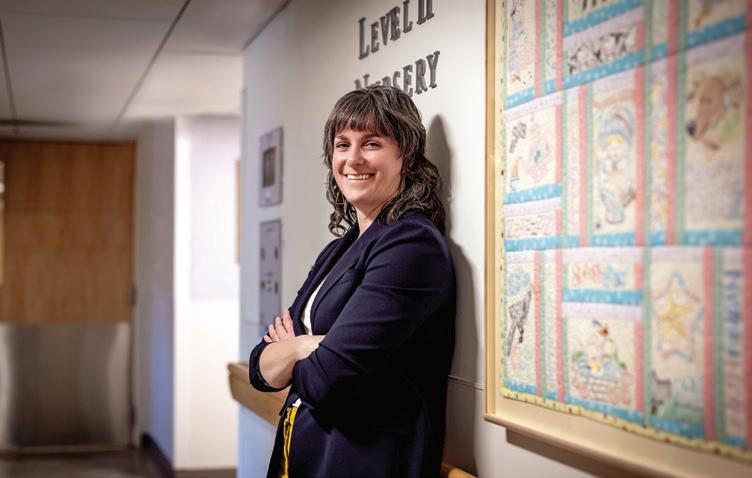
“Having a certified nurse-midwife on a patient’s care team improves outcomes while reducing perinatal health disparities.
Midwifery has never been more relevant than it is today.”
—Program Director Katharine Hutchinson
CSON Dean Katherine Gregory. “Since 1947, the Connell School has been dedicated to ensuring academic excellence in nursing education, and the graduates of the nurse-midwifery program will use their education, skills, and compassion to provide
evidence-based and uniformly excellent care that addresses an unmet need among patients, their families, and the wider community.”
The Connell School is partnering with Mount Auburn Hospital in Cambridge
and Mattapan Community Health Center, among other health care settings, for clinical placements for its nurse-midwifery students.
CSON Associate Professor of the Practice Thamarah Crevecoeur, a faculty member in the BC nurse-midwifery master’s program, is a certified nurse-midwife at Mattapan Community Health Center. Fluent in Haitian Creole and French, she cares for immigrants from Haiti and other parts of the Caribbean.
“Nurse-midwifery at BC is about advocating for our patients and ensuring the best possible outcomes,” said Crevecoeur.
In support of that objective, the Connell School has received a $1 million grant from the Massachusetts Department of Public Health to establish the Birthworker Equity in Education (BEE) Collaborative. The collaborative’s goal is to improve pregnancy and birth outcomes by providing midwifery student mentoring and coursework focused on health equity and optimal health outcomes during pregnancy and birth; strengthening birth workers’ skills and promoting midwifery growth across Massachusetts; and creating a clinical education site at Mattapan Community Health Center for group prenatal and postpartum care.
The Woods College of Advancing Studies at Boston College has entered into a new partnership that will provide students of Hellenic College, in Brookline, Mass., with access to new academic opportunities while allowing them to remain rooted in their Orthodox Christian campus community.
Under the terms of the agreement, signed on February 10, Hellenic College students may complete their school’s core curriculum—which is grounded in the Orthodox faith and the Hellenic heritage and introduces students to a variety of fields and disciplines, as well as critical thinking—then transition to the Woods College to develop the skills and knowledge required by high-demand fields in a rapidly evolving professional landscape.
Qualified Hellenic College students granted admission to the Woods College may pursue a bachelor’s degree in one of six majors: criminal and social justice, cybersecurity, digital communications, economics, information technology, and applied liberal arts with a political science concentration.
Administrators say the agreement represents the shared commitment by both institutions to foster academic excellence, holistic personal development, and faithbased community engagement.
“We are delighted to partner with Hellenic College,” said Woods College Dean David Goodman. “Our two schools have several commonalities, in offering degrees grounded in faith and the liberal arts en-
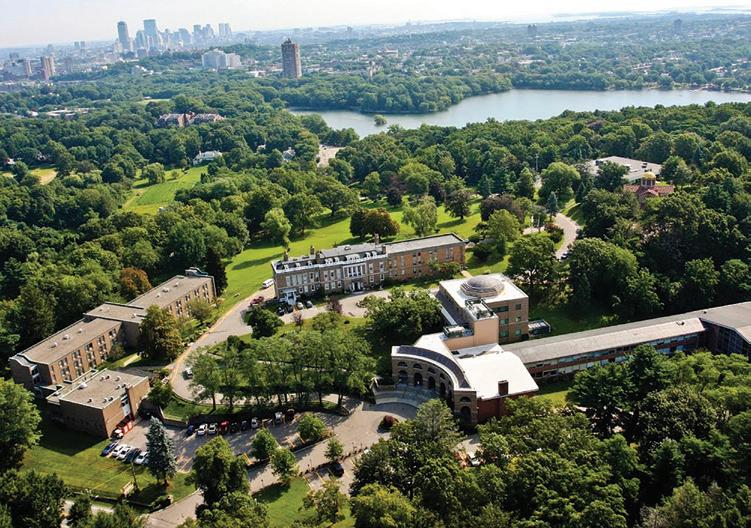
hanced by a practical focus, in our focus on service, and in our emphasis on personal attention to each student.
“This agreement dovetails with our Woods College mission to make a Boston College education accessible to students at all points in their academic journeys,” he said, “as well as to help students discern their passions, encourage their intellectual, personal, and spiritual growth, and equip them to succeed in a wide variety of professional capacities.”
Goodman added that academic and
cultural discussions may arise from the partnership that could enrich both communities.
Hellenic College President Demetrios Katos called the partnership “a wonderful opportunity for students to attend Hellenic College for the Orthodox Christian intellectual and spiritual formation while pursuing new professional interests to launch their careers.
“This partnership with the Woods College at Boston College strengthens Hellenic College as the educational and spiritual
formation center of our Church and advances its mission of preparing men and women for service to Church and society,” he said.
Hellenic College Interim Dean Nicholas Ganson added that “the new agreement opens up an opportunity for students inclined toward modern technical fields and the social sciences to benefit from Hellenic College’s distinctive Orthodox formational experience and then continue into those fields, assured of high-quality career preparation at Woods College.”
Founded in Connecticut in 1937 as Holy Cross Theological School, the institution relocated to Brookline in 1947, and later expanded its offerings into a full four-year liberal arts program named Hellenic College, which opened in 1968. Now known collectively as Hellenic College Holy Cross, it is the only accredited Orthodox Christian college, seminary, and graduate school of theology in the Western Hemisphere.
Woods College Senior Advisor to the Dean Claudia Pouravelis, a graduate of Boston College who ran point on the partnership discussions, finds the affiliation exciting on a personal level. “As someone who is Greek Orthodox, I recognize the value of Hellenic College as the premier educational institution for their programs. It is a small college but has a huge impact on the Greek Orthodox community nationally and internationally.”
—University Communications
BY KATHLEEN SULLIVAN STAFF WRITER
After World War II, many aspects of American life underwent dramatic changes—including the Catholic Church, notes Professor of Theology Mark Massa, S.J.: The rise of pluralism, the growing affluence of Catholics, and the Second Vatican Council all contributed to a transformed landscape for American Catholics, who moved from tight-knit urban communities into the suburbs, encountering people from other religious traditions. Catholics attended non-Catholic universities, and non-Catholics attended Catholic institutions. Catholic traditions such as meatless Fridays and the Latin Mass faded.
These social, cultural, and theological changes gave rise to a very strong strain of rejection, a fundamentalist Catholic movement based on fear and a loss of identity, according to Fr. Massa, director of the Boisi Center for Religion and American Public Life and author of the recently published book Catholic Fundamentalism in America
“Catholic fundamentalists want to go back to a more defined Church where Catholics can have a clear identity that’s different from the cultural identity of most people,” said Fr. Massa. “I define Catholic Fundamentalism as radical anti-modernism, characterized by a fear of change, pluralism, and debate.
“The rise of Catholic Fundamentalism is understandable. They offer an answer, but I think it’s the wrong answer. History only moves in one direction and it’s not backwards.”
Catholic Fundamentalism in America will be the subject of an April 2 panel discussion featuring Fr. Massa, Libby Professor of Theology and Law M. Cathleen Kaveny, University Historian and Clough Millennium Professor Emeritus in History James O’Toole, and historian Randall Balmer of
Dartmouth College. The event will take place from 5:30-7 p.m. at 245 Beacon St. in Auditorium 107; registration is available through the Boisi Center website, bc.edu/ boisi.
In writing Catholic Fundamentalism in America, his seventh book, Fr. Massa said he wanted “to understand what’s going on to the right of center in the American Catholic Church. Some people label everyone who is conservative a fundamentalist, but that’s not true. Not everyone right of center is fundamentalist. It’s a very small percentage. My book is an attempt to tease out what makes a fundamentalist different from a conservative.”
While many books have been written on Protestant Fundamentalism, which emerged after World War I, Fr. Massa said there has been little to no scholarly examination of Catholic Fundamentalism.
“With this book, I’m trying to fill a lacuna in the field. I want to offer language and nuance that can help others understand who Catholic fundamentalists are and why they’re so desperate to find a safe space that doesn’t change.”
Fr. Massa cites five criteria of Catholic Fundamentalism: sectarian; primitivist; apocalyptic; militant; and use of political monikers.
Sectarian is a defining feature for fundamentalists, since a sect wants to break away and form a close-knit community with high walls around it, according to Fr. Massa—sectarianism, however, is the opposite of Catholicism’s “big tent” ideas of communion and universality.
Primitivism is a belief that sometime in the primitive past the Church achieved its perfect form and cannot be changed, and any attempt to change that moment means a fall from grace. Among fundamentalists, he said, there is a historical belief that Church doctrine, worship, or ethical guidelines cannot change.
Messina College, Boston College’s twoyear residential college division, has officially joined the Phi Theta Kappa Honor Society, a milestone that also marks the establishment of the Beta Omega Rho chapter, which will serve as a new symbol of academic excellence and leadership at the college.
Founded in 1918 and recognized as the official honor society of two-year colleges by the American Association of Community Colleges in 1929, Phi Theta Kappa (PTK) honors students’ academic achievements at two-year colleges while offering opportunities for personal, professional, social, and academic growth. As the world’s largest honor society for two-year colleges, PTK has chapters at 1,300 colleges in 11 countries and a student success rate of 92 percent.
The Beta Omega Rho chapter was established to promote academic excellence, foster a greater sense of community, and encourage leadership development among its members. Over the course of the coming weeks, PTK staff will work with chapter advisors at Messina College to guide them
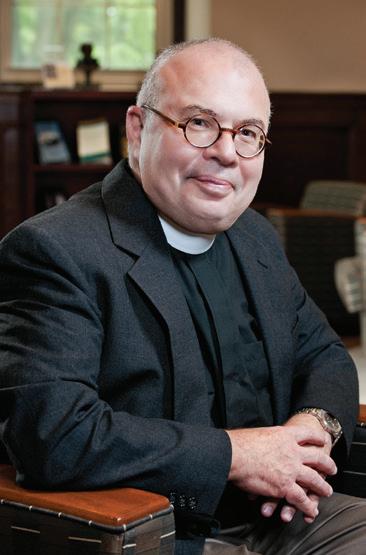
According to Fr. Massa, Catholic fundamentalists often speak in terms of apocalyptic urgency: “If we give up that one insight for newer insights, the world will end.”
Their militant stance, he said, relies on a binary dogmatism that means it’s got to be this or that, and if it’s not this, then the whole thing is false. “Theology is never that simple. It’s complicated because it’s talking about real life.”
In part one of Catholic Fundamentalism in America, Fr. Massa traces the emergence of Catholic Fundamentalism to Cambridge, Mass., in the 1940s. Leonard Feeney, S.J., was a charismatic Jesuit priest who would regularly speak at the St. Benedict Center in Cambridge. He insisted that outside the Church there is no salvation. Feeney, whom Fr. Massa described as “ra-
through advisor certification processes and develop a plan for the upcoming year.
Membership in PTK comes with numerous benefits for students, including exclusive scholarships, leadership development programs and workshops, professional growth tools and resources, as well as community engagement through networking opportunities, service, and leadership.
“We are honored to join Phi Theta Kappa and recognize our students’ achievements within this esteemed academic society,” said Messina College Associate Dean Alicia LaPolla. “The Beta Omega Rho chapter will offer Messina students valuable opportunities for academic excellence and professional development. We look forward to welcoming our inaugural cohort and fostering a strong, dynamic community at Messina.”
For more information about Phi Theta Kappa and the Beta Omega Rho chapter at Messina College, see www.ptk.org/chapters/ Beta-Omega-Rho-Chapter.
—Audrey Loyack
bidly antisemitic,” eventually was removed from the Jesuit order and excommunicated from the Catholic Church. Feeney founded his own religious order, the Slaves of the Immaculate Heart of Mary, which he said was the faithful remnant of a Catholic Church mired in heresy.
Fr. Massa writes: “Feeney and his Slaves crafted the paradigm for American Catholic fundamentalism—an anti-modern, reactive, and sectarian impulse that has been with us ever since.”
Subsequent book chapters look at other movements and people Fr. Massa cites as examples of Catholic Fundamentalism, such as Mother Angelica, who was wellknown for her broadcasts on the television network EWTN; the website ChurchMilitant.com; Crisis magazine; Fr. Gommar DePauw, who founded the Catholic Traditionalist Movement and was a leading proponent of the Latin Mass; and St. Marys of Kansas, a community closely connected to the Society of Saint Pius X, among others.
Earlier this month, the book was distributed to cardinals, bishops, scholars, journalists, and other attendees of The Way Forward Conference, an annual gathering jointly sponsored by the Boisi Center, Fordham University’s Center on Religion and Culture, and Loyola University Chicago’s Hank Center for the Catholic Intellectual Heritage.
For Fr. Massa, Catholic Fundamentalism in America contributes to the work of The Way Forward conferences, which is to help implement Pope Francis’s vision for the Catholic Church. “The national hierarchy in the United States is the most resistant hierarchy in the world to Pope Francis’s agenda. This book can help clarify what’s going on in the contemporary U.S. Catholic Church and offer insight into the larger picture of resistance to pluralism and change.”
“Inverness Unravels”
The Theatre Department presented “Inverness Unravels” at Robsham Theater March 20-23. Inspired by Shakespeare’s “Macbeth,” the play was devised by theater students and spearheaded by Dawn Meredith Simmons, the 2024-2025 Monan Professor in Theatre Arts.
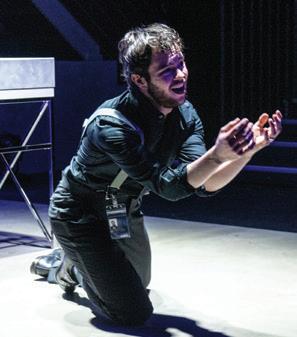
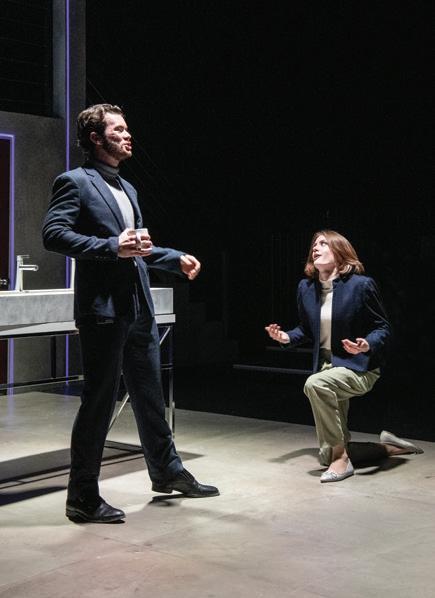
The spiritual journeys of young adult Hispanic Catholics in the United States as they grapple with questions of identity, faith, and belonging are the focus of a new three-part documentary, a project of the Clough School of Theology and Ministry, in association with Lost Nation Pictures.
The film series, “Longing for More: Young Adult Hispanic Catholics,” documents the experiences and perspectives of young adult Hispanic Catholics in the U.S., highlighting their faith, challenges, and hopes for the future while discerning the meaning of being Catholic in their lives.
“By providing a platform for young Hispanic Catholics to share their stories and perspectives, we hope to foster dialogue and understanding within the Catholic Church,” said Clough School of Theology and Ministry Professor Hosffman Ospino, an expert on the Hispanic Catholic experience in the U.S. who serves as the documentary’s executive producer.
“Longing for More” is an invitation to listen and engage, accompany and embrace, according to the filmmakers. More than half of Catholic youth and young adults in the country are Hispanic, with most having been born and raised in the U.S.
Ospino added: “Life unfolds for them in intimate relationships with immigrant families and friends. Their stories, questions, and commitments will be defining the direction of thousands of Catholic faith communities, educational institutions, and ministries in the next few decades.”
“Longing for More” was envisioned by Ospino as part of his work advancing research and designing initiatives to help the Church better understand the Hispanic Catholic experience. He invited awardwinning filmmakers James Rutenbeck and
Sabrina Aviles to work with him on the documentary.
A professor of Hispanic ministry and religious education, Ospino is an author and a researcher whose work regularly informs conversations about U.S. Catholicism. He has led several national studies on Hispanic Catholics in the U.S. and is the director of Nuevo Momento, a Lilly Endowmentsupported project that aims to strengthen the capacity of ministerial organizations dedicated to serving Hispanic Catholics throughout the U.S.
“Longing for More” director and editor Rutenbeck is an Emmy award-winning filmmaker and a two-time recipient of the Alfred I. duPont Columbia Journalism Award. He has directed groundbreaking films that are inspiring forays into the depths of the human experience, including “A Reckoning in Boston”; “Unnatural Causes: Is Inequality Making Us Sick?”; “Class of ‘27”; and “Nixon’s Reversal.”
Avilés, an independent filmmaker and educator, served as director and producer for “Longing for More.” The founder/executive director of CineFest Latino Boston, she has dedicated her life to lifting up the beauty and complexity of the Hispanic experience through film. She directed and produced the documentary “Raising the Floor” and contributed to the PBS series “Latino Americans.”
Part one of “Longing for More” is titled “The Acolytes of the South Bronx,” a 20-minute film featuring Christian De La Cruz, Joseff Rivera, and Noemi Meli, whose Catholic faith is the driving force of their lives, ministries, and relationships. They are part of El Centro, the Hispanic Catholic charismatic center of the Archdiocese of New York. These young people live their

faith grounded in a spirituality that guides them to experience the Holy Spirit through prayer, song, and service to their peers in a complex, busy, urban space.
Part one also features the Most Rev. Joseph Espaillat, auxiliary bishop in the Archdiocese of New York, who talks about the challenges facing young people today. He continued the theme of the documentary in an essay he wrote for America magazine about the need to engage Latino young adults who are disaffiliating from the Catholic Church. [The essay is available via the America website, www.americamagazine. org]
Part two, “Public Servant/Public Seeker,” is focused on State Representative Judith García of Chelsea, Mass. García is passionate about serving the most vulnerable in her community, many of them immigrants like
her own family. She often struggles to reconcile her commitments as a public servant with a faith tradition that lives deep within her. She feels the institutional Church has not always been at her side as she balances what it means to be a young Hispanic public servant and a Christian believer on a quest to spiritual self-understanding.
Part three, “The Liberation of Mauricio Najarro,” focuses on Najarro, the son of Salvadoran immigrants, a highly educated young adult Hispanic, a natural leader, and a devout Catholic. Though successful in many regards, he has experienced addiction, loneliness, and rejection. His identity and his humanity have been questioned, even by people who share his own faith convictions. The path of justice and the witness of countless other believers have galvanized his strong resolve to remain Catholic.
Rutenbeck and Avilés note that while all the subjects of this series were raised Catholic, many have struggled with issues in the institutional Church and not all have remained part of the Catholic Church. Writing in America, the filmmakers say the Catholic Church must accompany young Latino Catholics and “that process begins by making the effort to understand who they are and what is on their minds. They are a treasure to be cherished, supported, and nurtured. Church leaders need to recognize the abundant talent, intelligence, and vitality of a new generation of Latino Catholics.”
The documentary has been generously supported by Porticus and is being distributed in association with America Media. Learn more about the project and watch the three short films at www.bc.edu/longingfor-more
—University Communications
BY ED HAYWARD STAFF WRITER
James P. McIntyre Professor of Mathematics Solomon Friedberg, recognized for his scholarly work in number theory, representation theory, and automorphic forms—an analytical approach to complex mathematical problems—has been named a Fellow of the American Association for the Advancement of Science (AAAS).
He and 470 other scientists, engineers, and innovators who make up the 2024 class of fellows will be recognized at a forum in Washington, D.C., on June 7.
“I’m grateful for this recognition from the AAAS,” said Friedberg, who joined the Boston College faculty in 1996. “I am especially proud that this recognition comes from a multidisciplinary organization. As a mathematician, to see that the work I do is viewed as being important by a large group of scientists across the spectrum of the sciences is very exciting.”
Friedberg has received funding for his research from the National Security Agency, National Science Foundation, and Simons Foundation.
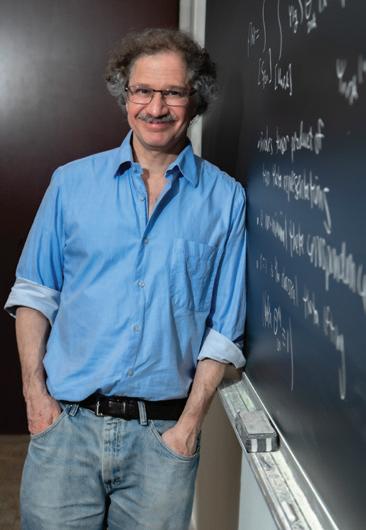
In addition to his scholarship, Friedberg served as the Mathematics Department chair from 2007 to 2016, years when a doctoral program and a new bachelor of science degree launched and enrollment in the department more than doubled.
Friedberg has also worked with colleagues in the Lynch School of Education and Human Development and Boston-area public schools to support secondary math teachers in high-needs districts.
Previously, Friedberg has been named a Fellow of the American Mathematical Society, a 2021 Simons Fellow in Mathematics, and for two years chaired the United States National Commission on Mathematics Instruction.
Grateful for the support of his colleagues and Boston College, Friedberg said he hopes that the recognition can help to amplify his voice in support of science and scientists at a time when research funding is in jeopardy.
“This is a time when science needs spokespeople to explain to the country why science is important and maybe, in some way, this will amplify that message, which many mathematicians and scientists are
putting out,” Friedberg said. “Is science a good investment for our national resources? My answer is yes. It is a very good investment. I hope to explain and share this perspective.”
One of the world’s largest general scientific societies and publisher of the Science family of journals, the AAAS first launched this lifetime recognition in 1874, about 25 years after the association was founded.
AAAS Fellows are recognized for their achievements across disciplines, from research, teaching, and technology to administration in academia, industry, and government to excellence in communicating and interpreting science to the public.
“This year’s class of Fellows are the embodiment of scientific excellence and service to our communities,” said AAAS Chief Executive Officer Sudip S. Parikh. “At a time when the future of the scientific enterprise in the U.S. and around the world is uncertain, their work demonstrates the value of sustained investment in science and engineering.”
For almost half a century, Linda Reams has been the first face of Boston College for prospective students
BY ALIX HACKETT SPECIAL TO THE CHRONICLE
On a busy day, the Boston College Office of Undergraduate Admission waiting room is abuzz with energy as hundreds of high school students and their families cycle through for tours and information sessions, their conversations reverberating through Devlin Hall. Sitting at the center of it all is Senior Receptionist Linda Reams, whose warm smile has been a balm to nervous teenagers for nearly half a century. For many new visitors, she is the first face they associate with the University.
Reams is set to retire this summer, just a few months shy of what would be a milestone 50th anniversary at Boston College. On paper, she has held the same position since she was hired in 1976, but a lot changes in 49 years: Reams has worked in three different buildings on campus, beginning with Gasson Hall (where pigeons constantly invaded the tower storage room), and reported to four different directors. When she started, applications and decision letters were hand typed and delivered through the mail. She and the rest of the staff referred to the week before decisions went out as “Paper Mountain Week” because of the stacks of materials covering their office floor.
“There were nights we were here until 12 or one o’clock in the morning, just sorting and checking everything,” she recalled. “If somebody was missing a teacher recommendation, you’d check it off; nothing was computerized.”
At that time, the admission office also used paper bulletins to communicate with prospective students, and one morning Reams got word that the company storing the leaflets had declared bankruptcy and any boxes not retrieved within the hour
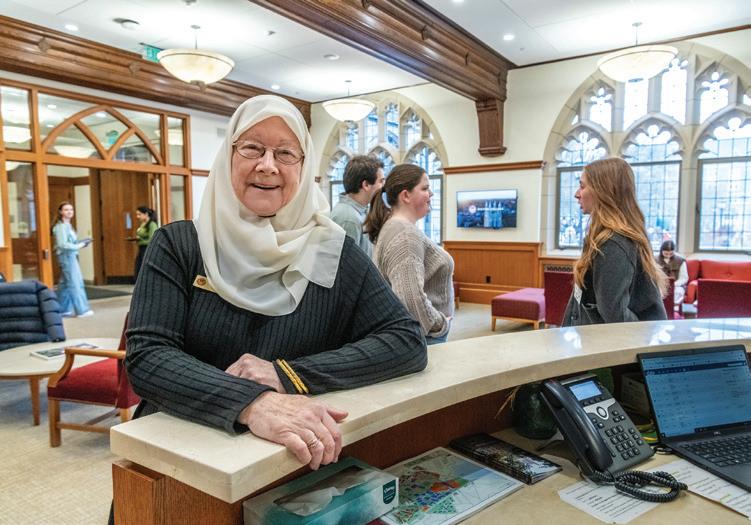
“I can meet 250 people three times a day here, but if just once my kindness has meant something to somebody, then I’ve done my job.”
—Linda Reams, Undergraduate Admission
would be considered abandoned property. She phoned her colleagues in Facilities Management, who rounded up all the trucks they could find, and she and her team drove with them to the warehouse, where they scooped up boxes at breakneck speed before the door was padlocked behind them.
Reams grew up in Dorchester and attended a Catholic high school but in 1990 she converted to Islam (her husband is a practicing Muslim), and a few years later, she decided to start wearing a hijab. As the face of the office, she worried that the change wouldn’t represent the University’s Catholic identity, so she approached University President William P. Leahy, S.J., as he was leaving a meeting.
“I said, ‘This is my job and I would like to stay, but if I can’t, I will quietly resign,’” she recalled. “And he just looked at me and said, ‘Who better to show diversity than
you at the front desk?’ And that was that.”
Reams arrives at work every morning shortly after 8 a.m., giving herself time to ready the waiting area and meeting rooms and go over the day’s schedule before the first crowd of visitors arrives. From then on, she greets a steady stream of students and parents, doing her best to alleviate any stress or anxiety they may be feeling. At this point in her career, she can spot nerves the moment someone walks through the door.
“A lot of times they’re scared so I tell them, ‘You’re going to end up where you’re supposed to be and any school that gets you is going to be lucky to get you,’” she said. “‘There’s only one you.’”
First impressions are important, and having someone like Reams behind the desk for so long has helped generations of BC students feel comfortable on the Heights, said Dean for Undergraduate Ad-
mission and Financial Aid Grant Gosselin.
“She’s always extending a warm hello, a welcoming presence, and a sense of calm during what can be a stressful admission process,” he said. “Boston College has been blessed to have Linda in this critical role.”
Since 1976, Reams has also acted as a mentor to current BC student ambassadors who volunteer in her office through the Student Admission Program. Over the years, she’s developed close relationships with hundreds of students, helping them navigate roommate conflicts and family losses, teaching them how to cook a turkey, and even picking them up at the airport after cancelled flights home. In her many years at BC, she’s only missed one Commencement, and she’s already promised one current student she’ll return for his ceremony in 2027.
“Linda treats all of our visitors with her signature attentive hospitality, but when I see her with BC students, she treats them with the caring heart of a family member, and the students feel the same way about her,” said Associate Director of Undergraduate Admission Chris O’Brien. “She believes in BC, in her colleagues, and in our mission to form these students into great adults.”
For her next chapter, Reams is looking forward to spending time with her husband and children, improving her garden, and relaxing on the beach near her home. She may finally have time to make the Hajj pilgrimage to Mecca with her son, something she’s been hoping to do for years. Being away from the students she’s come to love will be the most challenging adjustment, she said, but Reams feels nothing but pride for her career spent on the Heights.
“If I’ve made people comfortable and made them feel as though this is a home for their kids, that’s my biggest accomplishment,” she said. “I can meet 250 people three times a day here, but if just once my kindness has meant something to somebody, then I’ve done my job.”
Alix Hackett is a senior digital content writer in the Office of University Communications
Applicants have “given us great confidence in their ability to use their BC education to improve the lives around them, while also fulfilling personal goals,” said Dean of Undergraduate Admission and Financial Aid Grant Gosselin.
Contined from page 1
SAT/ACT test scores average 1503 and 34, respectively. A total of 74 percent submitted standardized scores, despite the University’s test optional policy.
Dean of Undergraduate Admission and Financial Aid Grant Gosselin said that the admitted class reflects Boston College’s strength as a destination for the nation’s best high school students.
“Not only have these students distinguished themselves in the classroom, but they’ve given us great confidence in their ability to use their Boston College education to improve the lives of those around them, while also fulfilling their personal goals.”
Gosselin said the Office of Undergraduate Admission will now turn its attention to yield efforts, with the goal of matriculating approximately 2,400 students into the class of 2029 by the May 1 deadline.
The office will host two Admitted Eagle Days on campus for students and their families on April 6 and 13, and hold 21 admitted-student programs in various states and countries in the coming month.
During the next five weeks, Undergraduate Admission expects to host approximately 20,000 visitors on campus for class visit programs, tours, and information sessions,
including the Keith A. Francis Discovery Weekend during April 12-14.
In addition, Gosselin said the Office of Financial Aid staff has put in great effort to prepare awards for admitted students and will continue to work with families throughout April to assist students in making their final enrollment decisions. As part of the process, the University has announced that it will award $190 million in undergraduate need-based financial aid this year, an increase of $13 million over the current academic year.
“The forecasts made by the enrollment analytics team give us confidence in the
number of offers we have extended, and our colleagues in the Office of University Communications have worked with our staff to put together an exceptional campaign to assist future members of the Class of 2029 in making their choice,” said Gosselin.
“I am grateful for the exceptional work of our Admission and Financial Aid staffs and University colleagues, and for the contributions so many other campus partners will make in the weeks to come. We look forward to welcoming the Class of 2029 to Boston College when classes begin on August 25.”
BY PHIL GLOUDEMANS STAFF WRITER
A Boston College faculty member is among the contributors to a recent report from the National Academies of Sciences, Engineering, and Medicine that recommends major investments for core research in ocean science, and infrastructure upgrades and replacements to support basic and applied research in ocean studies.
Earth and Environmental Sciences Professor Mark D. Behn was one of 23 contributors to the study, undertaken by the National Academies’ Committee on the 2025-2035 Decadal Survey of Ocean Sciences, which was sponsored by National Science Foundation (NSF).
The report offers advice to the NSF on how to focus investments in ocean research, infrastructure, and workforce development to meet national and global challenges during the next decade and beyond. The document also includes recommendations to enhance country safety, scientific leadership, and economic competitiveness through a thriving “blue economy”—an economic concept similar to the green economy focused on the sustainable use of ocean resources to create growth, jobs, and well-being while preserving the ocean’s health.
“It’s imperative that NSF continues funding basic scientific research, which provides the underpinnings for future applied science and innovation that directly benefits society,” said Behn, who is also the director of BC’s Weston Observatory. “We must continue to build and diversify the ocean science workforce, promoting quantitative training in STEM fields, while at the same time fostering transdisciplinary research that crosses boundaries with the humanities and social sciences, a goal that
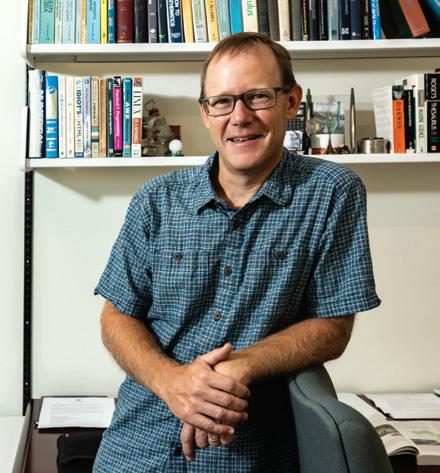
aligns with the Schiller Institute for Integrated Science and Society. The U.S. must also continue to invest in the infrastructure required to facilitate oceanographic research, such as the academic research fleet, scientific ocean drilling, and new autonomous vehicles.”
Behn noted that he provided expertise in marine geophysics and geodynamics, with a focus on how ocean science research can address societally relevant issues such as natural hazards—including earthquakes, tsunamis, and volcanic eruptions—sea level rise, and exploration for natural resources.
The report focuses on three themes of research critically important for improving forecasts of ocean processes:
•Ocean and Climate: The ocean presently absorbs 90 percent of the heat and approximately 30 percent of the carbon that results from global greenhouse gas emissions. Any decline in these rates of uptake would accelerate increases in atmospheric temperature and carbon dioxide levels, with the potential for impacts on processes such as hurricane
Earth and Environmental Sciences
Professor Mark Behn: “We must continue to build and diversify the ocean science workforce, promoting quantitative training in STEM fields, while at the same time fostering transdisciplinary research that crosses boundaries with the humanities and social sciences.”
creased precipitation and heat waves that impact both coastal and inland communities. Extreme events can influence major investments such as port facilities, commercial fishing fleets, and national defense infrastructure, and improving the ability to observe, understand, and forecast extreme events is critical. Research in this area includes improving early-warning systems of geohazards and increasing the ability to predict global weather extremes, and apply these forecasts to inform urban planning, agricultural, and forestry practices.
development and intensity, ice sheet stability, and ocean chemistry. Research in this area includes developing new approaches to observe heat transport, improving predictions of marine ice sheet instability, and developing ways to quantify carbon cycle variability.
•Ecosystem Resilience: Fundamental changes in Earth and ocean systems are resulting in ecosystem shifts that may negatively impact local and global communities dependent on them. Forecasting these ecosystem modifications and their causes could provide the early warning necessary to enhance communities’ ability to adapt to these changes. Research in this area includes determining the effects of warming, acidification, and de-oxygenation on the productivity of ocean biomes, and developing tools for rapid species diversity measurements.
•Extreme Events: The ocean contributes to earthquakes, tsunamis, hurricanes, storm surges, and flooding that directly affect coastal communities, as well as in-
“Understanding and anticipating change in the ocean and how it will affect marine ecosystems and humans has never been more urgent,” said H. Tuba OzkanHaller, dean and professor at Oregon State University’s College of Earth, Ocean and Atmospheric Sciences, and co-chair of the committee that authored the report.
“U.S. investments in ocean science, engineering, and technology are lagging behind our increased societal needs, while our international competitors are increasing their expenditures and advancing their resources and capacities. Our recommendations lay out a challenge for the research community to establish a new paradigm for ocean research that will provide forecasts to save lives and sustain livelihoods in the next decade.”
The National Academies of Sciences, Engineering, and Medicine are private, nonprofit institutions that provide independent, objective analysis and advice to the nation to solve complex problems and inform public policy decisions related to science, engineering, and medicine.
Read more at nationalacademies.org/ news/2025/02/new-report-provides-forecastfor-the-next-decade-of-ocean-science
Boston College School of Social Work
Salem Professor in Global Practice Theresa Betancourt, an internationally recognized expert in war-related childhood trauma, was selected as the 2025 Paul Hoch Award winner by the American Psychopathology Association (APPA). Betancourt received the award at the association’s annual meeting, held March 5-8 in Boston.
The award honors a distinguished and currently active investigator who has produced significant, generative research in the area being highlighted at the APPA meeting. This year’s event, according to the organizers, offered commentary and discussion intended to help integrate “our current understanding of the diverse pathways from social factors to mental illness and what stands in the way of this understanding being fully utilized to improve the lives of patients and populations.”
Betancourt, who joined BCSSW in 2017, is director of the school’s Research Program on Children and Adversity. Her two-decade study of children who were
pulled into Sierra Leone’s bloody 10-year civil war has been cited as the most extensive examination of post-war intergenerational relationships since studies of Holocaust survivors. Her recently published book, Shadows Into Light: A Generation of Former Child Soldiers Comes of Age, offers a fresh perspective on the project, including stories of some of the children—now into their adulthood—who are trying to make new lives for themselves.
She has also undertaken projects in Rwanda, Uganda, India, Ethiopia, and the Russian Federation. Betancourt is currently involved in intervention studies to help promote early childhood development and prevent violence among families in extreme poverty in Rwanda, and works with refugees in Boston and in communities around the world.
Her self-devised child protection framework, SAFE, reflects basic and interrelated security needs and rights that are central to promoting child protection: Safety from harm; Access to basic needs such as food,

shelter, and medical care; Family or connection to “attachment figures”; and Education and economic security. The framework has been employed by Betancourt in India, Sierra Leone, Rwanda, and northern Uganda, as well as by other researchers in Haiti, Pakistan, and Lesotho.
As part of the award presentation at APPA, Betancourt also delivered the Hoch Award Address, “Promoting the Mental Health of Children, Youth, and Families
Facing Adversity: Perspectives from PostConflict Sub-Saharan Africa to Families Resettling in the U.S.”
Founded in 1910, APPA is devoted to the scientific investigation of disordered human behavior and its biological and psychosocial substrates. It seeks to identify future directions in psychopathology research through the sponsorship of an annual conference that features leading and cutting-edge presentations on a specific research topic.
—University Communications
The Irish Studies Program marked the 25th anniversary of Boston College Ireland with a March 17 panel discussion in Connolly House that examined the changes on the island of Ireland, and in the United States, during the past quarter-century while offering thoughts about what may lie ahead.
BC Ireland Academic Director Mike Cronin joined Sullivan Chair in Irish Studies Guy Beiner, BC Irish Institute Director Mary Murphy, and Burns Librarian Christian Dupont in speaking at the event, which celebrated the 2000 launch of BC Ireland—a Dublin-based locus for Boston College programs, events, and activities, and a resource for BC faculty, staff, students, and alumni visiting Ireland.
As Cronin noted, BC Ireland also provided a Dublin base for BC’s involvement, via the Irish Institute, in the Northern Ireland peace process. Between 1998 and 2014, BC Ireland worked with the U.S. State Department, the U.S. Embassy in Dublin, and the U.S. Consulate in Belfast to send more than 1,200 cross-community participants to BC to further the shared dialogues that would ensure a lasting peace in Northern Ireland.
The panelists touched on political, social, and economic developments since BC Ireland opened and their impact on the study of Ireland.
Among the most significant changes in the last quarter-century, the four pointed to the rise of the non-Irish-born population of the Irish Republic—from less than one percent to 18 percent—and the rapid
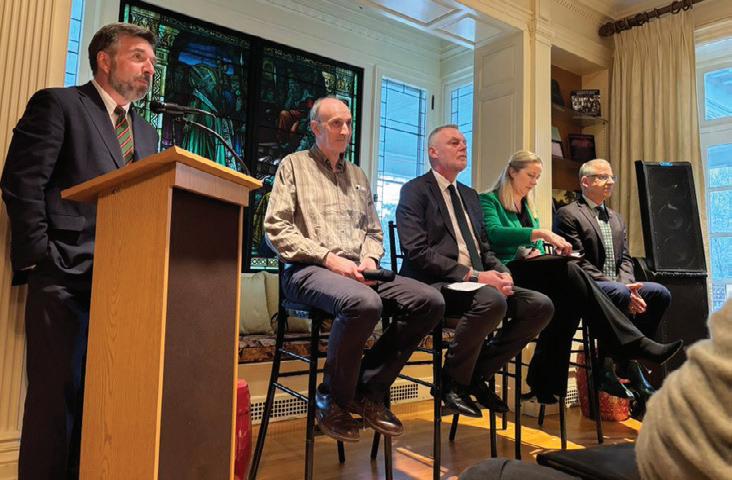
growth of the Irish economy around U.S. corporations based in Ireland, which now comprise 75 percent of the Irish gross domestic product.
Another topic concerned the impact of Brexit on the relationships on the island of Ireland and the forced realignment of the Irish-UK and Irish-European Union narratives. But a positive political, economic, and cultural view of Ireland continues despite the ongoing decline of Irish-born people living in the U.S., the panelists agreed, pointing to the role of BC’s Irish Studies Program in fostering an understanding of
Ireland on campus and beyond, and of BC Ireland in serving as a key destination and resource for BC students studying overseas.
Cronin, Beiner, Murphy, and Dupont also noted Irish culture’s powerful presence—from legendary writers such as Yeats and Synge to more recent literary stars such as Sally Rooney, as well as the success of “Derry Girls” and the Belfast-based Irish-language rap trio Kneecap—and its usefulness as a knowledge tool. BC has showcased this culture, said the panelists, through the collections of the Burns Library and its extensive Irish holdings,
the McMullen Museum of Art‘s displays of Irish art and material culture, and the Gaelic Roots Series featuring Irish traditional music. Other initiatives, such as the Burns Visiting Scholar in Irish Studies [see story on page 12], demonstrate the vibrancy of Irish Studies and the deep links to Ireland that exist on campus and at Boston College Ireland. The Office of Global Engagement also has fostered ties between BC’s academic community and those in Ireland promoting research that enriches both countries and the wider world.
Looking to the future, Cronin, Beiner, Murphy, and Dupont considered how BC—through Irish Studies, BC Ireland, the Irish Institute, and Burns Library— could be of benefit to Irish, Northern Ireland, and Irish American interests. They advocated for innovative interdisciplinary study of Ireland, and of the closely intertwined Irish-European-U.S. relationship, to engage students and scholars and support the work of the Irish Institute as it continues to promote cross-community and political dialogue on the island.
“BC Ireland has existed for a quarter of a century and welcomed thousands of students to Ireland, supported the work of faculty, and opened its doors to travelling alumni,” said Cronin. “Most importantly, BC Ireland gives voice to an institution that, through the vibrancy of its Irish-related campus experiences and learning opportunities, has been a valuable and important partner to the people and communities that live on the island of Ireland.”
—University Communications
BY ROSANNE PELLEGRINI STAFF WRITER
A group of prominent Boston College alumni has established a foundation to raise money, awareness, and support for alcohol and substance abuse treatment in honor of a local resident who, in recovery herself, was a powerful example and dedicated mentor to those in recovery.
Since 2023, The Maura Wilkins Foundation has provided funding and programs to assist individuals with alcohol and substance abuse addiction, with the goal of strengthening their recovery efforts and preventing relapses.
“I believe that everyone has a family member or friend who grapples with addiction,” said Executive Director Maribeth McKenzie MacDonald, who earned a master’s degree from the Lynch School of Education and Human Development in 1994. “This personal connection fuels our mission to help people achieve sobriety.”
MacDonald said that, according to the National Institute of Drug Addiction, 12step programs are among the most effective methods for promoting long-term abstinence from substance abuse.
“Regrettably, however, these retreats are often expensive, and many individuals residing in halfway homes and sober houses
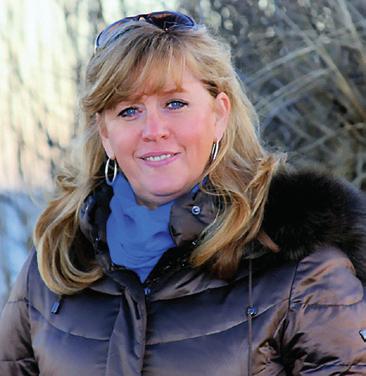
lack the financial resources to participate,” she said. “The Maura Wilkins Foundation organizes and facilitates events to ensure inclusivity, irrespective of participants’ financial circumstances.”
Headquartered in Braintree, Mass., the foundation was established by MacDonald and her husband Tom—a prolific author who earned an M.B.A. from BC’s Carroll School of Management in 2002 and has taught creative writing in the Woods College of Advancing Studies.
The couple was joined in their effort
by a group of friends, also with strong ties to the University, who recognized the challenge of the recovery journey and the need for affordable retreats, workshops, and social events to support individuals in recovery from alcohol and substance abuse.
Foundation co-founders who serve on its board of directors include NHL Players’ Association Executive Director Marty Walsh WCAS ’09, Jane Pikor ’79, and Boston Public Schools Facilities Management Assistant Director P.J. Preskenis, an adjunct professor of marketing at the Carroll School. Ken Casey, lead singer of popular Boston-based Celtic-punk band Dropkick Murphys, also was a founding board member who remains involved in the effort.
“Boston College’s motto, ‘Ever to Excel,’ and Pedro Arrupe’s call for Jesuit-school graduates to be ‘men and women for others’ strongly resonate with the mission of the Maura Wilkins Foundation,” said Walsh, the former mayor of Boston and Secretary of Labor during the Biden administration. “We take pride in aligning with these principles and addressing the needs of individuals in recovery through innovative approaches.”
The foundation is committed to creating retreats and sober events that uplift individuals on their journey of recovery from alcohol and substance abuse. Each gather-
ing is thoughtfully crafted to inspire hope, resilience, and foster a sense of community—essential ingredients for anyone navigating the transformative path of recovery. Everyone is welcome, and no one is denied access due to financial difficulties.
The foundation also partners with the Gavin Foundation, which supports individuals struggling with substance abuse and addiction—to connect those in recovery with role models who have long-term sobriety—as well as with halfway houses. Residents are welcomed at the foundation’s events to meet others in recovery. This fosters connections and friendships, and ensures that individuals have support systems.
The foundation was established “with love and gratitude” in memory of its namesake: Maura Wilkins, who was born in Tobercurry, County Sligo, Ireland, and lived in Milton for 40 years. According to the foundation website, “Maura was a shining light to all who had the privilege of knowing her. She extended her hand to help others in recovery with a smile, a hug, and her great Irish wit. As she told us, ‘Don’t leave before the miracle happens.’ We consider ourselves blessed that she was our friend.”
More on The Maura Wilkins Foundation, its mission, programs, leadership, and donation information at maurawilkinsfoundation.org
Boston College School of Social Work
Professor Rocío Calvo, founding director of the school’s Latinx Leadership Initiative (LLI), has been elected vice president of the Society for Social Work and Research (SSWR), a national organization committed to advancing research that improves the health and well-being of individuals, families, and communities.
“I am profoundly grateful for the opportunity to serve as SSWR’s next vice president,” said Calvo, who officially joined the organization’s board of directors for a two-year stint on February 1. “I am deeply committed to the organization’s mission of advancing research that addresses realworld practice and policy challenges to improve the well-being of society.”
Calvo has dedicated her career to understanding and addressing complex social issues confronting Latinx communities. Her work is deeply rooted in social work principles, with a particular focus on collaborating with and empowering communities to create policies and programs that promote systemic change.
Her election as vice president of SSWR exemplifies her stature in the social work field, where she has been recognized for her innovative interventions and contributions to the profession, and received substantial research funding from major organizations.
Calvo’s research centers on understanding how to improve access to social services for Latinx populations, with an emphasis on working with communities to improve their health and well-being. Her signature achievement is creating the LLI, a cohortbased program that prepares bilingual and bicultural social workers to accompany Latinx communities in developing sustainable solutions to complex problems in health, education, housing, and other areas.
Since Calvo founded the program in 2013, students have taken culturally and linguistically attuned courses in Spanish, completed internships in settings such as schools, hospitals, and shelters, and conducted cutting-edge research that has
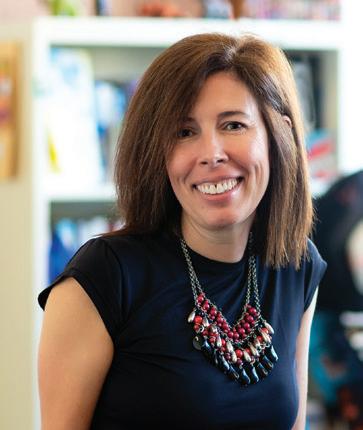
shaped social workers’ strategies to support Latinx clients.
The Center for Diversity at the Council on Social Work Education, the sole accrediting body for social work programs in the United States, named the LLI a Model Program for Diversity Education. Excelencia in Education, an advocacy group, recognized the LLI with a top award for accelerating the educational success of Latinx students in a graduate program.
Supported by a five-year, $2.8 million grant from the National Institutes for Health, Calvo and her colleagues are currently testing a culturally and linguistically appropriate intervention for reducing vaccine hesitancy among Latinx patients at the East Boston Neighborhood Health Center and the South End Community Health Center.
Calvo’s scholarship, like BCSSW’s mission to partner with individuals, families, and communities to solve intractable social problems, aligns with SSWR’s new strategic plan to address complex social issues. During her more than two decades of involvement with SSWR, Calvo has helped create the Latinx-Focused Research Cluster, which she later chaired; reviewed research submissions for the organization’s annual conference; and facilitated the conference’s Latinx-Focused Special Interest Group.
—Jason Kornwitz is a senior editor/writer in the Boston College School of Social Work
Read more at bit.ly/calvo-sswr
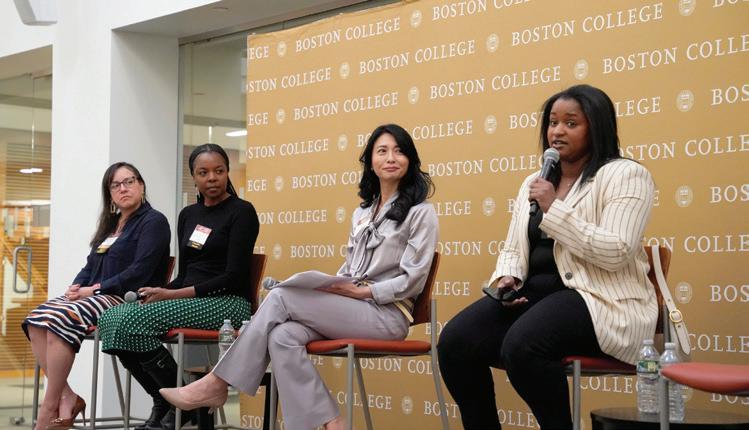
How do we stop hating people who oppose principles and norms we hold dear—without suspending our moral judgment? Prof. Stephen Pope (Theology) offered thoughts on the subject in an essay for Commonweal.
Prof. Kent Greenfield (Law) weighed in for The Boston Globe on Supreme Court Chief Justice John Roberts’ rebuke of President Trump for calling to remove a federal judge who ruled against his deportation plan.
Prof. Hosffman Ospino (CSTM) provided comments to Crux.com regarding a recent study on religion in America showing that the percentage of Hispanic adults who identify as Catholic has steeply declined since 2007.
In a National Catholic Reporter piece about allegations against new Washington, D.C., archbishop Cardinal Robert McElroy, Libby Professor of Theology and Law Cathleen Kaveny commented on why hearsay is legally and morally problematic.
Assoc. Prof. David Hopkins (Political Science) spoke with the Huffington Post on one Democrat’s reasoning for voting to formally rebuke United States Rep. Al Green for his protest during President Trump’s speech to Congress.
Prof. Emeritus Paul Lewis (English) discussed satire as a tool in political criticism,
The following are among the recent positions posted by the Department of Human Resources. For more information on employment opportunities at Boston College, see www.bc.edu/jobs or scan the QR code at right.
Associate Director of Financial Systems, Reporting and Planning
Resident Director
Associate Vice President of Facilities Services
Associate Director, Pre-Award Administration
Program Director and Assistant Program Director, AMDG
Public Safety Dispatcher
Assistant Director of Biology Labs
Temporary Office Pool
Director of Assessment and Accreditation, Lynch School of Education and Human Development
Senior Budget Financial Applications Analyst
Campus Security Officer
First Cook/Chef
Campus Minister
Registered Dietitian
and how its use may cross the line to become a form of bullying, for an article appearing in the German online publication Deutsche Welle.
Woods College of Advancing Studies Associate Dean Aleksandar Tomic, director of the school’s graduate programs in applied economics and analytics, talked with KEYT News (California) about stock market volatility and the outlook for recession.
Carroll School of Management Sweeney Professor Mary Ellen Carter provided comments for a Wall Street Journal report regarding the new FBI director’s shares in a foreign company with ties to China.
In a WalletHub Q&A, Assoc. Prof. Michael Grubb (Economics) discussed the benefits of creating a budget and provided tips for making it work.
Asst. Prof. Oliver Wunsch (Art, Art History, and Film) was interviewed for a Boston Globe article about “MAGA red” and the historical associations of color.
The Lynch School of Education and Human Development’s Department of Formative Education, which extends BC’s leadership in the area and includes interdisciplinary research with a lifelong focus, was featured by Learning Well Magazine, with comments by founding chair Assoc. Prof. Chris Higgins

Associate Director, Procurement Services
Athletics Marketing and Fan Engagement Intern
Assistant Registrar, Curriculum and Course Management
Associate Video Production Analyst, Football
Leadership Coach, Lynch Leadership Academy
Network Systems Engineer
Case Manager, Student Support and Outreach
BY SEAN SMITH CHRONICLE EDITOR
For Caoimhe Nic Dháibhéid, a historian who is the current Burns Visiting Scholar in Irish Studies at Boston College, the impact of the Irish Revolution (19161923)—like other sweeping historical events—is discerned not merely through military engagements and political drama.
There also is significance to be found in the personal papers of Irish women imprisoned during the revolution, she says, or the requests for compensation by Irish citizens who had endured losses—personal as well as property—as a result of the conflict, or a Dublin child’s panicked reaction to a Charlie Chaplin film several years after the revolution ended.
Nic Dháibhéid will explore this human dimension at the spring semester Burns Lecture, “Love in the Time of Revolution: Intimacy, Affection and Kinship in Ireland, 1916-1923,” which takes place on April 9 in Burns Library at 6 p.m. (preceded by a 5 p.m. reception). The event is free and open to the public.
A collaboration between the Irish Studies Program and University Libraries, the Burns Scholar program brings outstanding academics, writers, journalists, librarians, and other notable figures to the University to teach courses, offer public lectures, and work with the resources of the Burns Library in their ongoing research, writing, and creative endeavors related to Irish history, art, and culture.
Nic Dháibhéid is a professor in Irish history and faculty director of Education for Arts and Humanities at the University of Sheffield, where she has taught since 2013. She works primarily on Irish history, in particular the Irish Revolution, and more broadly the history of political violence and terrorism since the 19th century. Her current research engages the cultural history of the Irish Revolution, focusing particularly on the history of emotions.
“I’m interested in the inner lives of people who lived through that period, civilians and combatants alike,” said Nic Dháibhéid, who co-chairs an expert advisory panel to support the writing of a history of British policy during the Northern Ireland Troubles. “The revolution brought substantial changes to Ireland, but also a new dynamic to personal relationships among Irish people who were caught up in it. Couples met through revolutionary activities, so love was more than deep affection, economic rationale, or finding your place in the social strata; it was also a political declaration.”
“The revolution also caused a rupture to familial and personal relationships, whether through separation, imprisonment or death, and spouses, children, siblings, other relatives, as well as friends, had to contend with the burden of revolutionary love as well as its excitement. At the lecture, I want to talk about these various forms of love—romantic, platonic, familial—in the
context of the Irish Revolution, and what a closer reading of affection and intimacy during this period might say about Irish revolutionary dynamics.”
Nic Dháibhéid follows a similar path in the undergraduate course she is teaching, The Irish Revolution: Living, Fighting and Dying in Ireland, 1916-1923, which examines the paramilitarism of political culture, the nature and dynamics of revolutionary violence, and entrenchment of divisions. But for her, the emphasis is on personal experiences.
“What was it like to be a rebel, a policeman, a soldier, a civilian during that time?”
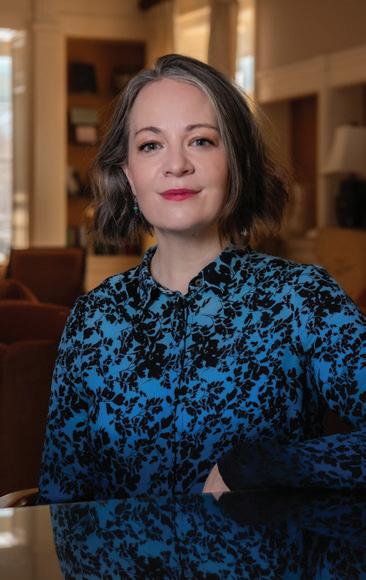
personal correspondence and diaries.”
For example, while researching in the Burns Library archives, Nic Dháibhéid came upon a collection of autograph books that Irish women jailed by British authorities passed along to one another. These contain details like prisoners’ jail and home addresses as well as reminiscences, short verses of prose or poetry, and words of support and inspiration.
“It’s fascinating to look through these books and see how these women kept a record of their presence, and in doing so demonstrated solidarity with one another,” said Nic Dháibhéid.
Such personal memorabilia can be revealing, she noted, and so can more official correspondence. Several years ago, she combed through an archive of letters written by Irish citizens to the newly established post-revolution Irish government seeking compensation for losses they sustained during the conflict.
“As part of the process, they had to narrativize and monetize their losses, which in some cases was pretty straightforward: Somebody’s house was damaged in the fighting and needed a certain amount to repair the damage. But then there were people whose husband or son had been killed and who were deprived of their breadwinner within the family: How do you put a figure on something like that?
“Yet through the compensation process, a number had to be determined for what that loss amounted to. As bereaved families navigated that very bureaucratic, official process, we can glimpse the pain and the loss that the revolution meant for many people.”
photo by lee pellegrini
she explained. “What was it like to watch a funeral for someone who had been killed, or to jeer at soldiers or other combatants, or to wonder if the fighting might someday reach your doorstep? Fortunately, there are rich primary sources that offer such details, whether it’s newspapers, official reports, or
The full impact of a family member’s death might not always have been readily apparent or understood, adds Nic Dháibhéid. In 1920s Dublin, a young boy named Donagh MacDonagh watching “Shoulder Arms,” a satirical war film by Charlie Chaplin, suddenly experienced a panic attack and had to be taken out of the theater. Donagh’s father, Thomas, was one of the leaders of the 1916 Irish Easter Rising who had been executed by the British; hours after his father’s death, the family’s home had been raided by British sol-
diers. These experiences had inculcated in Donagh a terror of soldiers in uniform— even if they were flickering images on a movie screen.
“The wider effect of conflict-related trauma is a relatively new area of research in my field; we still don’t know much about what it was like for children who lived through the Irish Revolution,” said Nic Dháibhéid. “And there are still questions about how adults fared during that time, too, but through these kinds of accounts, and the stories that emerge from personal or official documents, we can begin to understand. My role as a historian is to treat these stories with care and respect. I feel privileged to have this kind of access to people’s lives, and I’m often moved by the intimacy of the personal correspondence and other papers.”
Nic Dháibhéid—who had previously visited the campus a few times for academic events—was familiar enough with the reputation of BC’s Irish Studies Program and the Burns Library holdings to apply for the Burns Scholar position. Two months into the semester, her regard for BC has been bolstered by the students she’s encountered, whether through her class or in other circumstances.
“I’m so impressed by the students’ engagement, their willingness to ask questions, and to participate sincerely with material which may be unfamiliar to them,” she said. “We know that research-led teaching is highly beneficial for students, but I think it’s equally true that the insights that come out of teaching feed back into the research—and so I’m an equally firm believer in teaching-led research. It’s been a wonderful experience all around.”
Nic Dháibhéid studied history and French at University College Cork and later earned master’s and doctoral degrees at Queen’s University Belfast, where she served as a postdoctoral research fellow at the Institute of Irish Studies. She also was a Rutherford Research Fellow at Fitzwilliam College, Cambridge, and a research fellow at the University of St Andrew’s Handa Centre for the Study of Terrorism and Political Violence.
Cardinal Lazzaro You Heung-sik, the prefect of the Dicastery for the Clergy at the Vatican, will make a campus appearance on April 3 to talk about the history, faith, and mission of the Catholic Church in Korea. He will present “The Witness of Korea in the Church and the World” at 5 p.m. in Higgins 300.
A native of Nonsan, South Korea, Cardinal Lazzaro You will draw on his vast experience to provide insights and commentary on the growth of the Church in Korea and its impact on the global Catholic community.
Cardinal Lazzaro You was appointed to his current position in 2021 by Pope Francis, whom the cardinal welcomed to Asian Youth
Day in 2014 while bishop of the diocese of Daejeon. The Dicastery for the Clergy is responsible for overseeing matters regarding priests and deacons not belonging to religious orders. It handles requests for dispensation from active priestly ministry, as well as the legislation governing presbyteral councils and other organizations of priests around the world.
As head of the Korean Bishops’ Conference Peace Committee, Cardinal Lazzaro You visited North Korea four times in efforts to promote peace and reconciliation. In 2018, at the behest of Pope Francis, he participated in the Ordinary Assembly of the Synod of
Bishops for Youth. Since 2021, he has served in the Congregation for the Evangelization of Peoples.
Cardinal Lazzaro You’s talk is being presented by the BC Global Korea Project, the Office of Global Engagement, and the Institute for the Liberal Arts; sponsors for the event also include the Morrissey College of Arts and Sciences Dean’s Office, the Asian Studies and International Studies programs, and Eastern, Slavic, and German Studies Department. For more information, email ingu. hwang@bc.edu.
—University Communications